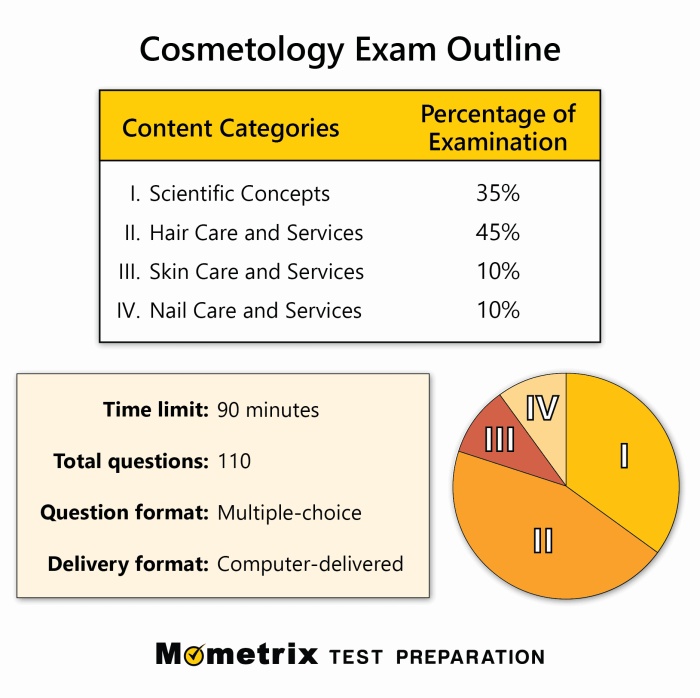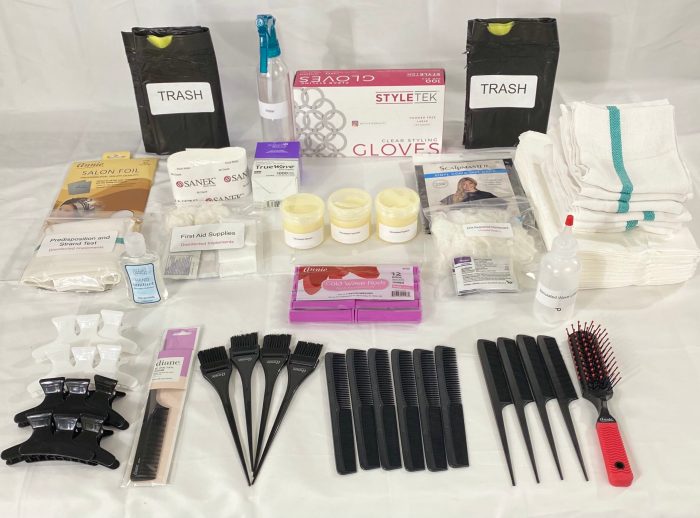The theoretical exam in cosmetology, known as examen teórico examen de cosmetologia, holds immense significance in the field of beauty and personal care. It evaluates the fundamental knowledge and understanding of aspiring cosmetologists, ensuring their readiness to provide professional services.
This comprehensive guide delves into the purpose, format, and preparation strategies for this crucial exam, empowering candidates to achieve success and embark on a fulfilling career in cosmetology.
Theoretical Exam Overview

The theoretical exam in cosmetology is a comprehensive assessment that evaluates a candidate’s knowledge and understanding of the fundamental principles and practices of cosmetology. This exam plays a crucial role in ensuring that cosmetologists possess the theoretical foundation necessary to perform their duties safely and effectively.
The format of the theoretical exam typically consists of multiple-choice questions, true/false questions, and short answer questions. The exam duration varies depending on the specific licensing requirements, but it generally ranges from two to four hours.
Topics Covered in the Theoretical Exam
- Cosmetology Concepts and Principles
- Hair Science and Care
- Skin Science and Care
- Nail Science and Care
- Client Consultation and Assessment
- Salon Management and Ethics
Exam Preparation Strategies
Effective preparation for the theoretical exam requires a comprehensive study plan and the utilization of various resources. Here are some key strategies to enhance your exam preparation:
Study Methods and Techniques
- Active Reading: Engage with the study material by highlighting, taking notes, and summarizing key concepts.
- Flashcards: Create flashcards to reinforce important terms, definitions, and concepts.
- Practice Tests: Take practice exams to familiarize yourself with the exam format and identify areas for improvement.
Key Resources and Materials
- Cosmetology Textbooks: Utilize textbooks and manuals that cover the core concepts and principles of cosmetology.
- Online Resources: Explore reputable websites and online courses that provide supplemental study materials and practice questions.
- Professional Journals: Read industry journals to stay updated on the latest trends and advancements in cosmetology.
Time Management and Exam-Taking Strategies
- Time Allocation: Allocate sufficient time for studying each topic, allowing for ample practice and review.
- Prioritize Topics: Focus on mastering the core concepts and principles that carry a higher weight in the exam.
- Exam Day Strategies: Arrive at the exam well-rested and prepared with all necessary materials.
Cosmetology Concepts and Principles

Cosmetology is grounded in a set of fundamental concepts and principles that guide the practice of hair, skin, and nail care. Understanding these principles is essential for cosmetologists to provide safe and effective services.
Key concepts include the anatomy and physiology of hair, skin, and nails; the chemistry of hair and skin products; and the principles of sanitation and disinfection. Cosmetologists must also possess a strong understanding of the scientific basis behind cosmetology techniques and treatments.
Examples of Principle Applications, Examen teórico examen de cosmetologia
- The pH balance of hair and skin products is crucial for maintaining the health and integrity of these tissues.
- The proper use of disinfectants and sterilization techniques prevents the spread of infection in the salon environment.
- Understanding the structure and properties of hair allows cosmetologists to tailor treatments to meet individual client needs.
Hair Science and Care
Hair science encompasses the study of the structure, properties, and functions of hair. Cosmetologists must have a thorough understanding of hair science to provide appropriate care and treatments.
Key topics in hair science include the anatomy of the hair shaft, the hair growth cycle, and the factors that affect hair health. Cosmetologists also learn about hair damage, hair treatments, and hair styling techniques.
Principles of Hair Care
- Regular cleansing and conditioning are essential for maintaining healthy hair.
- Chemical treatments, such as perming and coloring, can damage hair and require special care.
- Protective hairstyles, such as braids and buns, can prevent hair breakage and damage.
Skin Science and Care
Skin science focuses on the structure, functions, and types of skin. Cosmetologists must have a comprehensive understanding of skin science to provide appropriate skin care treatments.
Key topics in skin science include the anatomy of the skin, the skin aging process, and the factors that affect skin health. Cosmetologists also learn about skin disorders, skin care products, and skin care techniques.
Principles of Skin Care
- Regular cleansing, moisturizing, and sun protection are essential for maintaining healthy skin.
- Exfoliation and masks can help improve skin texture and radiance.
- Specialized treatments, such as facials and peels, can address specific skin concerns.
Nail Science and Care
Nail science involves the study of the structure, growth, and properties of nails. Cosmetologists must have a thorough understanding of nail science to provide appropriate nail care and treatments.
Key topics in nail science include the anatomy of the nail, the nail growth cycle, and the factors that affect nail health. Cosmetologists also learn about nail disorders, nail care products, and nail care techniques.
Principles of Nail Care
- Regular nail trimming and filing are essential for maintaining healthy nails.
- Artificial nail enhancements, such as acrylics and gels, can damage nails and require proper removal.
- Protective nail care products, such as cuticle oil and nail strengtheners, can help improve nail health.
Client Consultation and Assessment
Client consultation and assessment are crucial steps in providing personalized and effective cosmetology services. Cosmetologists must possess strong communication and interpersonal skills to gather client information and evaluate their needs.
Key aspects of client consultation include active listening, open-ended questions, and thorough observation. Cosmetologists also learn about client confidentiality, ethical considerations, and the importance of developing customized treatment plans.
Techniques for Gathering Client Information
- Initial consultation forms
- Verbal interviews
- Visual assessments
Salon Management and Ethics: Examen Teórico Examen De Cosmetologia

Salon management encompasses the principles and practices of running a successful salon business. Cosmetologists must have a basic understanding of salon management to ensure the smooth operation of their salon.
Key topics in salon management include financial management, marketing and advertising, customer service, and staff management. Cosmetologists also learn about the ethical responsibilities of salon owners and employees.
Ethical Considerations in Cosmetology
- Maintaining client confidentiality
- Providing accurate and honest information to clients
- Upholding professional standards and continuing education
Essential Questionnaire
What is the purpose of the theoretical exam in cosmetology?
The theoretical exam assesses the candidate’s understanding of the fundamental principles, concepts, and techniques of cosmetology, ensuring their readiness to provide safe and effective services.
What topics are typically covered in the theoretical exam?
The exam covers a wide range of topics, including hair science and care, skin science and care, nail science and care, client consultation and assessment, salon management and ethics, and cosmetology concepts and principles.
How can I effectively prepare for the theoretical exam?
Effective preparation involves studying the exam syllabus, utilizing study guides and textbooks, practicing mock exams, and seeking guidance from experienced cosmetologists or instructors.